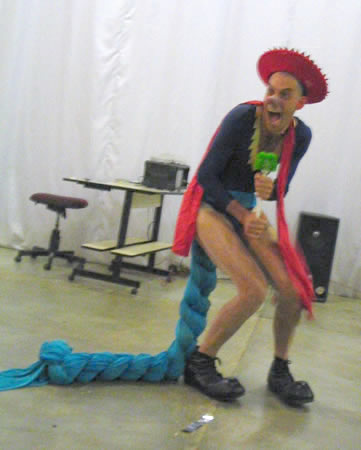Clowning experimentations
Kátia Maria Kasper*
The following text is a little anticipation, an announcement preceding a paper that will appear on the next edition of Alegrar, about clowning experimentations as conceived in our PhD thesis.
Starting from the participation as an “observer” of the personal clown initiation process conducted by LUME – Centre for Theatrical Research – UNICAMP – this research not only tackles historical aspects and trajectories of some contemporany clowns, but analyzes the political role of the clown, powerful ally in the construction of life possibilities. Different to a character, the clown works with a logic of his/her own, involving singular modes of acting, thinking, feeling. Through a transversal approach, inspired also by aspects of the Deleuzean philosophy of difference, we explore the creation of clown bodies, which are, in th is art, the great differentiators. The clown body, which goes beyond a form defined by costume and make-up, incorporating a “bundle of impulses”, a body prepared to “think in movement”, open to otherness, brings us other understandings of the relationships between body and thinking. A body created in experimentation, exposed, ready to play.
is art, the great differentiators. The clown body, which goes beyond a form defined by costume and make-up, incorporating a “bundle of impulses”, a body prepared to “think in movement”, open to otherness, brings us other understandings of the relationships between body and thinking. A body created in experimentation, exposed, ready to play.
Various voices are summoned to compose this collective assembly, setting the reader among the clowns. With Spinoza, we recuperate the political meaning of joy, defined as a force to affect and be affected, as opposed to the sad passions – like resentment and guilt – which sever us from our strength. The sad passions are the flank by which power seizes us, paralyzes us, stealing our force to act and our capacity to be affected. Joy, on the other hand, reconnects us with our strength. Laughter implies intensity. Intensity take hold of us and make us feel differently.
*Kátia Maria Kasper did her PhD on Education, Society, Politics and Culture in the Faculty of Education of the Sate University of Campinas (Universidade Estadual de Campinas – UNICAMP) from which resulted the thesis Experimentações clownescas: os palhaços e a criação de possibilidades de vida (Clowning experimentations: the clowns and the creation of new possibilities of life), financed by the Foundation of Support to the Research of the State of São Paulo ( Fundação de Amparo à Pesquisa do Estado de São Paulo – FAPESP).
